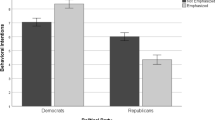Abstract
What role, if any, do incidental emotions play in people’s beliefs about climate change and support for climate mitigation policies? This question has received surprisingly little attention, despite a growing recognition that reactions to climate change information are shaped by various contextual factors beyond the information itself. Drawing on recent perspectives in psychology and communication, we conducted an experiment (N = 719) in which participants were randomly assigned to one of two emotion-induction treatments (guilt or anger) or to a no-emotion (neutral) control condition immediately before reading a news story about negative climate impacts and reporting on related policy preferences (e.g., support for taxing carbon polluters). Results revealed a number of significant effects, some of which emerged for the sample overall (e.g., guilt increased support for particular climate mitigation policies) and some that depended on personal and message factors suggested by prior research (e.g., political affiliation and social distance). Overall, these findings suggest that emotions may play an important role in guiding how the public processes and reacts to information about climate change.


Similar content being viewed by others
Notes
We opted not to employ a no-article control condition to keep the informational context in which participants reported their policy preferences roughly equivalent and to help bolster the credibility of the cover story.
References
Angie AD, Connelly S, Waples EP, Kligyte V (2011) The influence of discrete emotions on judgment and decision-making: a meta-analytic review. Cogn Emotion 25:1393–1422
Dunlap RE, McCright AE (2008) A widening gap: republican and democratic views on climate change. Environment 50:26–35
Hamilton L, Stampone MD (2013) Blowin’ in the wind: short-term weather and belief in anthropogenic climate change. Weather Clin Soc 5:112–119
Hart PS, Nisbet EC (2012) Boomerang effects in science communication: how motivated reasoning and identity cues amplify opinion polarization about climate mitigation policies. Commun Res 39:701–723
Heede R (2014) Tracing anthropogenic carbon dioxide and methane emissions to fossil fuel and cement producers, 1854–2010. Clim Chang 122:229–341
IPCC (2013) Working group I contribution to the IPCC fifth assessment report climate change 2013: the physical science basis summary for policymakers. http://www.climatechange2013.org
Kunda Z (1990) The case for motivated reasoning. Psychol Bull 108:480–498
Lazarus RS (1991) Emotion and adaptation. Oxford University Press, New York
Leiserowitz A (2006) Climate change risk perception and policy preferences: the role of affect, imagery, and values. Clim Chang 77:45–72
Leiserowitz A, Maibach E, Roser-Renouf C, Hmielowski JD (2011a) Politics & global warming: democrats, republicans, independents, and the tea party. Yale project on climate change communication. Yale Project on Climate Change Communication, New Haven
Leiserowitz A, Maibach E, Roser-Renouf C, Smith N (2011b) Global warming’s six Americas, May 2011. Yale Project on Climate Change Communication, New Haven
Leiserowitz A, Maibach E, Roser-Renouf C, Feinberg G, Marlon J, Howe P (2013) Public support for climate and energy policies in April 2013. Yale Project on Climate Change Communication, New Haven
Leiserowitz A, Maibach E, Roser-Renouf C, Feinberg G, Rosenthal S (2014) Climate change in the American mind: April, 2014. Yale Project on Climate Change Communication, New Haven
Lerner JS, Keltner D (2000) Beyond valence: toward a model of emotion-specific influences on judgment and choice. Cogn Emotion 14:473–493
Lerner JS, Keltner D (2001) Fear, anger, and risk. J Pers Soc Psychol 81:146–159
Lerner JS, Gonzalez RM, Small DA, Fischhoff B (2003) Effects of fear and anger on perceived risks of terrorism: a national field experiment. Psychol Sci 14:144–150
Li Y, Johnson EJ, Zaval L (2011) Local warming: daily variation in temperature affects beliefs and concern about climate change. Psychol Sci 22:454–459
Meijnders AL (1998) Climate change and changing attitudes. Effect of negative emotion on information processing (unpublished doctoral dissertation). Technische Universiteit Eindhoven TUE, Eindhoven, Netherlands
Mills JN, Gage KL, Khan AS (2010) Potential influence of climate change on vector-borne and zoonotic diseases: a review and proposed research plan. Environ Health Perspect 118:1507–1514
Myers TA, Nisbet MC, Maibach EW, Leiserowitz AA (2012) A public health frame arouses hopeful emotions about climate change: a letter. Clim Chang 113:1105–1112
Nabi RL (2003) Exploring the framing effects of emotion: do discrete emotions differentially influence information accessibility, information seeking, and policy preferences? Commun Res 30:224–247
Paolacci G, Chandler J (2014) Inside the Turk: understanding mechanical Turk as a participant pool. Curr Dir Psychol Sci 23:184–188
Roeser S (2012) Risk communication, public engagement, and climate change: a role for emotions. Risk Anal 32:1033–1040
Rosentrater LD, Sælensminde I, Ekström F, Böhm G, Bostrom A, Hanss D, O’Connor RE (2012) Efficacy trade-offs in individuals’ support for climate change policies. Environ Behav 45:935–970
Rothschild ZK, Landau MJ, Sullivan D, Keefer LA (2012) A dual-motive model of scapegoating: displacing blame to reduce guilt or increase control. J Pers Soc Psychol 102:1148–1163
Schuldt JP, Roh S (2014) Of accessibility and applicability: how heat-related cues affect belief in “global warming” versus “climate change”. Soc Cogn 32:217–238
Schwarz N (ed) (2000) Emotion, cognition, and decision-making. Psychology Press, Philadelphia
Small DA, Lerner JS (2008) Emotional policy: personal sadness and anger shape judgments about a welfare case. Polit Psychol 29:149–168
Smith N, Leiserowitz A (2014) The role of emotion in global warming policy support and opposition. Risk Anal 34:937–948
Spence A, Pidgeon N (2010) Framing and communicating climate change: the effects of distance and outcome frame manipulations. Glob Environ Chang 20:656–667
Walser M (2013) Carbon footprint. In Encyclopedia of Earth. http://www.eoearth.org/view/article/150926/
Author information
Authors and Affiliations
Corresponding author
Electronic supplementary material
Below is the link to the electronic supplementary material.
ESM 1
(DOC 439 kb)
Rights and permissions
About this article
Cite this article
Lu, H., Schuldt, J.P. Exploring the role of incidental emotions in support for climate change policy. Climatic Change 131, 719–726 (2015). https://doi.org/10.1007/s10584-015-1443-x
Received:
Accepted:
Published:
Issue Date:
DOI: https://doi.org/10.1007/s10584-015-1443-x




